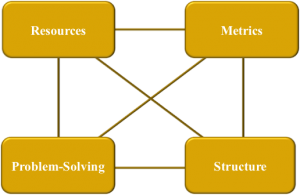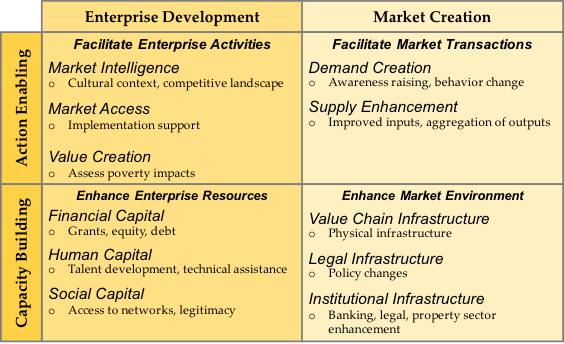Scaling in BoP markets
Scaling is the stage of development in which too many inclusive businesses come up short. While many pilots are launched, few of these achieve sustainability at scale. Without an understanding of the unique demands for scaling in base of the pyramid (BoP) markets, inclusive business leaders will struggle to achieve the performance and impact intended. To enhance their likelihood of success, enterprise leaders need to leverage existing tools, strategies, and approaches focused on achieving sustainability at scale in BoP markets.
Building sustainable, scalable inclusive businesses (IBs) is not easy, especially in Base of the Pyramid (BoP) markets. For too long, the implicit assumption has been that each inclusive business faces a unique situation and therefore has to respond in a unique way. To be sure, each inclusive business faces a distinct context. But leveraging existing frameworks and strategies that can be customised for common challenges – creating the right internal design, planning for scale, building a viable value proposition and seeking the right partners – are crucial for enterprise leaders seeking sustainability at scale. These strategies provide a set of guiding principles that, when adapted to the enterprise’s unique context, can help IB leaders avoid some classic mistakes, while providing a roadmap for the journey to scale. This page focuses on the following four challenges:
- Designing the business model
- Planning for scale from the start
- Understanding and managing value creation
- Developing partnerships
Four scale challenges
Designing the business model
While execution is important for any business, inclusive businesses will be more successful when they initially engage in learning and experimentation to build a business model appropriate for the BoP context. This requires emphasising innovation in business model development. The opportunity for business model innovation is influenced by four key factors: resources available, structure, problem-solving approaches, and metrics (see Business Model Innovation Framework below). The right talent and financial resources must be in place, appropriate problem-solving strategies must be encouraged, the structure must match internal and external realities, and metrics must account for both learning and performance objectives.

Some important questions for each key factor include the following:
- Resources: does the team have the right portfolio of skills & experiences to engage in BoP markets? Do the financial investors offer sufficient flexibility to innovate?
- Metrics: do the short-term metrics allow for innovation and value both success and failure? Do the long-term metrics consider financial and social performance?
- Problem-solving: is the team engaging appropriate internal and external partners in developing their business model? Is the team solving the right problems?
- Structure: does the legal entity support the desired capital structure and scope of activities? Do organisational & geographic locations of team enable BoP-oriented innovation?
Planning for scale from the start
An inclusive business must plan for scale from the start and expect to transition through (outlined below) co-creating in the envisioning stage, innovating in the piloting stage and embedding in the expand stage. Specific principles are needed at each stage:
- In the envision stage, entrepreneurs must understand how to co-create solutions with the BoP. In addition, they must ensure they have the ability to identify and leverage assets and platforms that work well in these contexts, as well as recognise how much they don’t know. After some early challenges, Cemex’s Patrimonio Hoy recognised that success required a learning orientation. Rather than designing a solution for the BoP, Patrimonio Hoy is designed with the BoP.
- In the pilot stage, businesses must orchestrate effective experiments that focus on testing specific hypotheses and that provide clear learning outcomes. These pilots must also consider who/what the competition is, how to achieve the necessary level of market creation, and how to scale that approach. Inclusive businesses must also pay attention to what happens when a pilot is over, and the impact this can have on the communities it served. P&G experienced this when, after much experimentation, it realised that its water purification product, PUR, would not be commercially viable. The company decided the pilot would become a project, and receive support through CSR funding instead.
- At the expand stage, businesses must be sure to build the skills they need to continuously collect, learn from and act on evolving information from the BoP market and its customers and producers. Expanding to new markets requires both understanding the type of competitive advantage needed to ensure long term success, and recognising the type of capabilities that must be nurtured to enter markets more effectively and efficiently over time. When Unilever sought to expand its agent-based sales model, Shakti, in India, rather than developing its own distribution network from scratch, it invested in partnerships with over 350 non-profit and development organisations that were already embedded in the target communities.

Understanding and managing value creation
Any business that wishes to achieve sustainability at scale must truly understand the value it creates for its customers, suppliers, and other key stakeholders. Simply put, this means providing these stakeholders with benefits that they value more than the costs to acquire them. It sounds easy, but in BoP markets incorrect assumptions about what people value are made too often. In BoP markets, alleviating poverty is a key source of key value creation. Business leaders, therefore, must understand how their business model alleviates poverty. They must also understand how to improve their value proposition by enhancing the positive impacts from their enterprise activities as well as how to mitigate any negative ones. They must also recognise that their value proposition may change in different contexts and over time. By creating more value (and alleviating more poverty), enterprises create greater opportunities to capture more value.

Developing Partnerships
In order to build sustainable and scalable enterprises in impoverished market environments such as the BoP, inclusive business leaders will likely need to integrate their efforts with a variety of partners, including those from the development community. What matters is not how many partners an enterprise has, but whether it has built the necessary partnership ecosystem. The journey to scale requires that entrepreneurs understand the partnership opportunity landscape and align available support with the enterprise’s priority needs (see Partnership Ecosystem Framework below). There are different types of potential partnerships. Businesses may need to develop partnerships that help enable business activities, such as implementation support or market access, or those that build the capabilities of the enterprise itself, such as training or financing. They may also need to engage partners that can build the market environment within which their enterprise operates – raising customer awareness or ability to engage.

Creating a sustainable, scalable inclusive business is a challenging endeavour. However, using standardised frameworks that can be customised to specific contexts offers the prospect of leveraging lessons learned and enhancing the likelihood of enterprise success. If successful on their journey to scale, the impacts from these enterprises can be truly transformational for the BoP, as well as the leadership team and their investors and supporters.